Community Justice Scotland on the road – part 2
We need to tell the stories of local reparation and change, instead of so often focussing on the damage done.
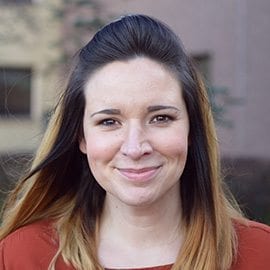
On Tuesday we headed for Falkirk, where we were welcomed by Lynda Ross-Hale, Senior Manager for the Cyrenians. The Cyrenians have a long history of supporting those engaged in Community Payback Orders in Falkirk, believing in people and building on their strengths.
One particular project, the regeneration of the Walled Garden in Dollar Park has returned a forgotten treasure to the local community.
The garden is now completely maintained by those completing unpaid work, some of whom have remained involved in the upkeep of the space and encouraged to develop water features and growing spaces.
We met the local Provost taking a walk in the garden, who was incredibly emotional about the beautiful green space created, and it was clear a lot of fond memories had been restored for him and his community.

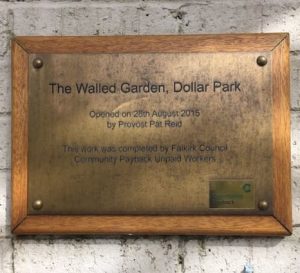


While the residents of Falkirk have visibly benefited from the Walled Garden in Dollar Park, the project taught us the value of allowing people to continue to engage if they still have more to give, often beyond the length of their Community Payback Order.
Linda and her team really understood this and provided access to sustainable opportunities for everyone, whatever that might look like.
Finally a return to Fife on Thursday. I was met at Kirkcaldy Town House by Bill Kinnear, Service Manager for Criminal Justice Social Work. Bill kindly plied me with caffeine before I went out to visit Unpaid Work projects being completed across Kirkcaldy and Glenrothes.

These included planting a sensory garden for care home residents, restoring an underpass to improve resident safety and maintaining an allotment that provided soup packs to local Food Banks.
I was particularly struck by the support unpaid work gave to the Kirkcaldy Food Bank, completing all deliveries to distribution centres every three days.
Without this support the service couldn’t operate, at time when demand is greatly increasing.
Unpaid Work in Fife is keen to develop in new and creative ways to benefit those completing orders and local communities.
Ideas include ‘up-cycling’ furniture for people without the funds to buy and identifying training for Unpaid Work Supervisors to support clients with their welfare needs, including education and employment.
Management were really listening, and I got the impression there was no such thing as a ‘silly question’ from anyone involved.
I don’t think I understood how much unpaid work benefited the communities most blighted by crime, but it does.
We need to tell the stories of local reparation and change, instead of so often focussing on the damage done. The Unpaid Work service also supports a lot of organisations to achieve things they otherwise couldn’t, and it should be possible for them to donate their own skills and time to those completing orders for the purposes of their rehabilitation.
“Motivating people, tackling inequalities, creating opportunity and sustainable support are everyone’s business.”
What a week! I am a suitably changed woman, as always, by everyone we met and a huge thanks to everyone who gave their time. There is obviously a lot more to see, but so far my experience has only reinforced how privileged I feel to learn from people so passionate about change for those experiencing community justice and within the communities more affected.
Semper Sursum!
Community Justice Scotland on the road – part 1
For those of you who know Karyn McCluskey, it will be of no surprise that Samantha Whipp and I were put straight out to work on our first day as Improvement Leads with Community Justice Scotland.
Our direction was simple – what does effective, community-based justice look like in Scotland? We were quick to appreciate this would take more than a week to research, however appointments were set up across the country and we went on our merry way.
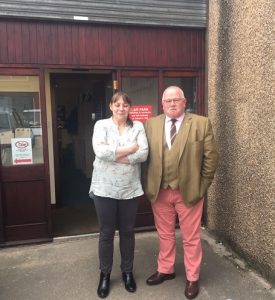
We wanted to see what was out there for people working with community justice services that support their needs, and to begin to understand some of the characteristics present in services that were making a real difference to people’s lives. This might be directly or indirectly, and include their families, the victims of crime and wider communities.
We arrived in sunny Inverness and were met by Alastair McDonald, Service Manager at Apex Highland. A man instantly recognisable by his smile and pink trousers! Apex work closely with Criminal Justice Social Work in the Highlands to deliver both adult and youth services. These include Acupuncture, SMART – Recovery, counselling, mentoring and community outdoor projects. We were impressed with their commitment to providing intensive, wrap around services for their clients.
Examples of this were everywhere, not least in the animal sanctuary they supported through unpaid work. This allowed those attending to build skills and gain qualifications, while addressing their needs and spending some reflective time with animals in their care.
After bidding Alistair and his devoted team a fond farewell, we headed off to meet Libby at the Libertie Project, a social enterprise for people with lived experience.
Here, making ceramics and creative projects are used as therapeutic mediums that improve wellbeing, while developing pre-employment skills.
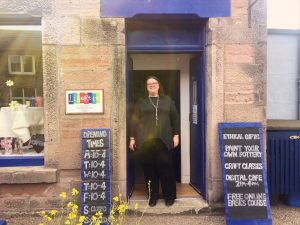
Libby herself is an inspiration. She recognises that Highland rurality poses challenges in delivering services, and so is seeking funding to deliver a digital access programme to those in the most remote areas using a van.
She is also working with HMP Inverness on a social enterprise involving prisoners. This will produce mugs for local and national retailers, charity and community groups.
Any appropriate name ideas for this project are greatly appreciated!
Our trip to the Highlands ended with Libby, reminding us of the need to be flexible when delivering services in terms of their availability and location, as well as the needs they address.
This is likely as true in the Highlands as it would be in parts of Glasgow, based on the social isolation faced by so many in the criminal justice system.
Karyn McCluskey: I do not underestimate the challenge
Sometimes when we consider the complexity of society and the tremendous challenges it offers us, it can feel overwhelming.
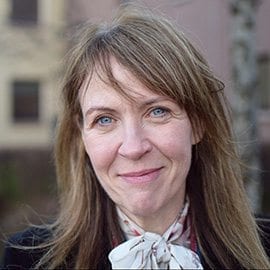
Deprivation, homelessness, crime, disease – organisations, processes and plans can seem like feeble tools in the face of such insurmountable problems.
It’s true there is much to do; the prison population is stubbornly high, too many children suffer the worst of outcomes and our communities still struggle with the blight of poverty. But although it may not feel like it, we are always being presented with the opportunity to make real change – the trick is to recognise and seize it.
“And when that means changing the destiny of some of the most excluded in society, improving outcomes for them, their children and their children’s children, we must all rise to the challenge.”
Our incarceration rate is one of our biggest public health problems. Once someone is infected by it, it often becomes chronic – and then it starts to spread. More than half of those leaving prison are reconvicted within a year of release and the children of prisoners are much more likely to end up in the criminal justice system.
So how do we deal with those who present to us in the criminal justice arena? We spend many hundreds of millions on imprisonment and justice but the results – despite huge efforts – are nowhere near where they need to be.
I know our prisons are essential – I have dealt with many people who need to be locked-up for the public’s safety.

Our prison system deals with many of the most damaged and damaging people in Scotland, and my colleagues in SPS are committed to transforming the lives of those in their establishments.
We know that if nothing else is offered the law and prison will be used as primary shield against crime. Yet we know that justice delivered in a community setting can transform individuals, whilst repaying their debt to the victims and communities.
We know that less than a third of those on Community Payback Orders reoffend and we know that the right support, given at the right time can prevent offending, improving lives for every one of us; those at risk of offending, their families and the community.
We have a strong body of evidence around what works to reduce offending, but it’s not being used consistently. For those that know me, they will know that I have a passion for prevention at early years, for those at risk and indeed in preventing further offending or victimisation. Prevention is mentioned in every meeting I attend, we seem to know what we want to do, it’s our ability to deliver it is often the challenge (and I include myself in that).
My colleagues and I have spent the past few weeks meeting with our partners across the country; those on the front line, those who support them and those who train them; police, prison and community payback colleagues; local authorities, third sector organisations, academics and people whose lives have been touched by crime and the justice system. We have seen the great work that is happening all over Scotland and we are ready to champion and support it – and likewise, we will not shy away from recognising what isn’t working.
“We have the evidence and we have the skills – we must now find the bravery and leadership to put this country at the forefront of prevention and community justice.”
I do not underestimate the challenge, and neither will you…but I know that the view will be worth the climb.
